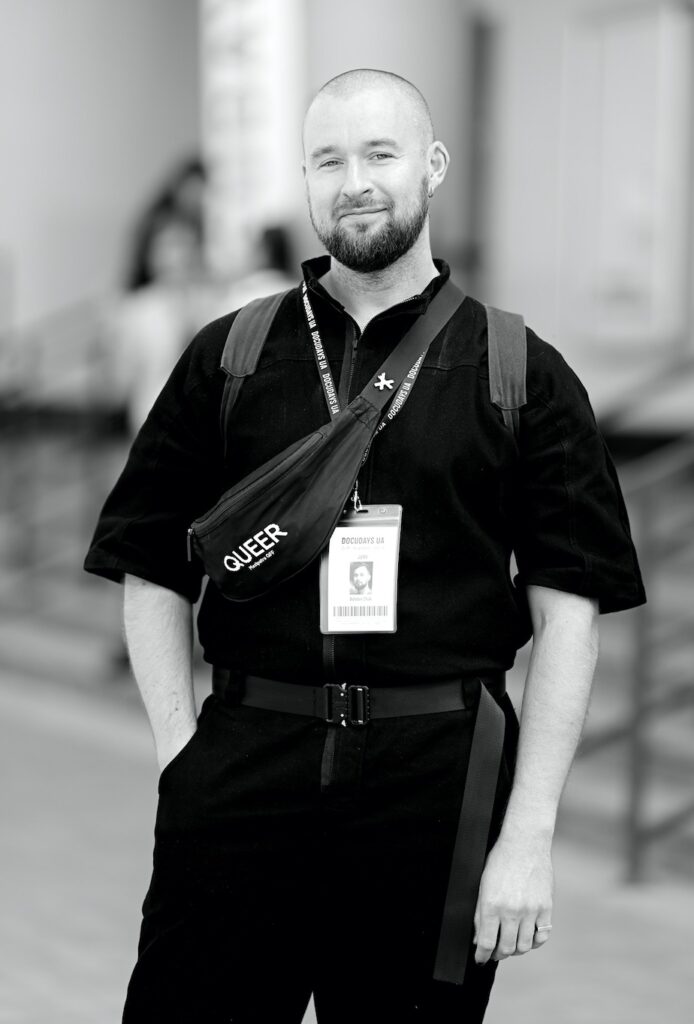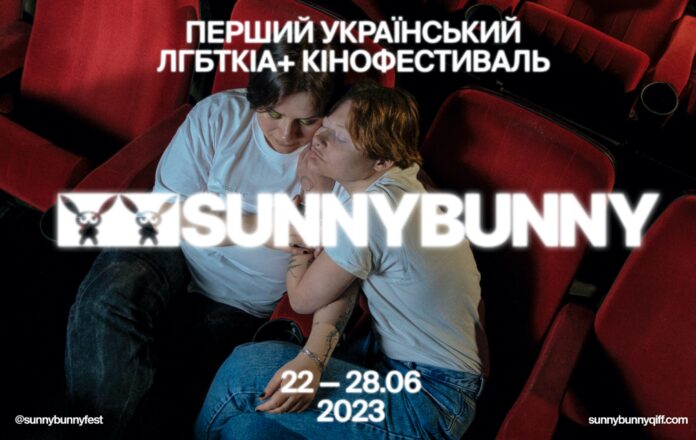The Sunny Bunny Film Festival in Kyiv, June 22 to 28, is the city’s first LGBTQIA+ film fest. This stand-alone event is an offshoot of Molodist, Kyiv’s world cinema festival. Sunny Bunny director Bohdan Zhuk has worked with Molodist since 2014, curating queer film programs. He thinks now is the right time for Kyiv to have its own dedicated queer film festival. He spoke with PGN about Ukrainian cinema and creating Sunny Bunny.
Before we talk about Sunny Bunny, what can you say about how things are in Ukraine right now, especially for the queer community? Is there much homophobia, or more of a sense of solidarity?
It’s a difficult question. It is definitely not easy for anyone. We see terrorist acts on Russian’s part — they recently blew out the dam. There are attacks everywhere all the time. We’re all suffering one way or another, and all of us are affected. For the queer community, as a marginalized and stereotyped social group, it could be more difficult in some ways. It is more difficult and dangerous in the occupied territories, especially if you are queer. They have policies against queer people. The rest of Ukraine, if we leave aside how we are affected by the war, there is more acceptance and solidarity. All Ukrainians have one enemy, and we are working for the victory. It doesn’t matter if you are gay, or lesbian, or heterosexual. We are all contributing to this as much as we can. This has been reflected in several polls that have shown growth in terms of acceptance of queer people. In 2021, we had 40% of Ukrainians accepting queer people and believing in equality for LGBTQ+ people. Now it is more than 60%. A major contribution to this is LGBTQ military. It has been a big movement since 2018. Since Russia’s full-scale invasion, it has become a bigger and more visible movement, so that contributes to higher acceptance.

What can you say about the state of queer Ukrainian cinema?
We showed this collection of short films on LGBT [soldiers] in the military that Maksym Nakonechnyi made a few years ago at Molodist. Queer cinema has been getting better. There are a lot of short films made every year. There have been a few features, but due to the war it is hardly possible to make films [right now]. Documentaries are being made, but fiction films are more complicated and difficult. The film industry and filmmakers are dependent on government funding, which has not been coming through since the invasion. There is some government support, but filming is very difficult because it is impossible to guarantee any security.
I’ve been trying to promote Ukrainian queer films around the world, so I curated programs for different festivals for visibility. Most folks don’t think of Ukrainian cinema when they think of queer films, but there are many. For Sunny Bunny, we are doing a retrospective of queer Ukrainian films. This year we have six features. There were too many shorts, so we are doing one collection of six shorts and two shorts on the military. Maybe next year’s edition, we will do a retrospective of short Ukrainian queer films.
This your first dedicated Sunny Bunny queer film festival. Can you talk about how it came about?
Molodist, which means “youth,” started in 1970 as a student short film showcase at the then Kyiv Institute of Theater and Film. Over the years, it grew into a big international film festival. It was one of the major festivals in the region. As a part of it, Sunny Bunny, the queer program, has existed since 2001, even though queer films in other programs existed since at least the 1990s, Sunny Bunny launched a dedicated program of queer films with a prize for the best LGBTQ+ film. Last year, we did a reduced edition of the Molodist festival in December, for obvious reasons. This year, we decided to launch Sunny Bunny as a stand-alone event. We thought it was the right time to do this because it is crucial to talk about human rights, which equals LBTGQ+ rights, especially during war. There is no better time for this.
It’s admirable that you are hosting a film festival during wartime. It’s important not just for visibility and equality, but also creating a safe space. Can you talk about this?
We are doing it primarily for the community and to have this safe space — not literally safe, which is impossible right now. There are not that many events dedicated to queer culture in Ukraine. Sunny Bunny has been a leading event in Molodist over the past 20+ years, so now that it is becoming a bigger and more visible festival, it is important and essential for the community to have this sense of unity among queer people.
It has contributed over the years to more acceptance in some ways as well. Sunny Bunny maintains this goal and is getting the attention of the wider public; it is aimed at broad audiences to engage and see the diversity of queer cinema, the beauty of it, and how it is innovative. Queer cinema contributes greatly to the general development of cinema, and we have seen many examples of this over decades. Working at Molodist, I’ve seen that Sunny Bunny is a trendy and fashionable part of it. It is unusual. These are not films that people would see anywhere else, so it provides a unique opportunity. We don’t have a lot of filmmakers coming from abroad, but a few are brave enough to come to Kyiv and present their films in person.
What criteria do you have for what you screen — in term of diversity and content?
At the end of day, we still have to choose from what is available and what we see, and it is not always the extent of diversity we would like. There are too few films made by queer women about queer women, or by/for transmen and transwomen. We get a lot of films from Western Europe and North America, but we want better representation from different countries and the spectrum of the LGBTQ+ community. We don’t have any specific criteria, but we want to and aim to show as much diversity as possible. We look at how innovative these films are and how rare subject is and how well the films are done. What’s exciting is watching a film not knowing anything about it. You may discover something brilliant.
To view the festival program, visit: https://docs.google.com/document/d/1qYxzlpYD-MWhSVJPGoDhsB0Gg6n5nva21lAIx1JRcS8/edit
To donate to Sunny Bunny, visit: https://molodist.com/en/article/sonacnij-zajcik-stae-persim-v-ukraini-lgbtik-kinofestivalem
